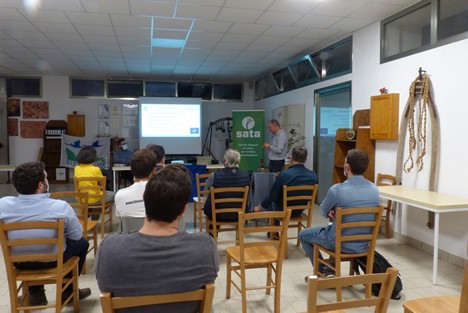A conference based on the impact of intensive agriculture on biodiversity and the increase in the availability of technical means that have caused the exploitation of land, was held to discuss how cultivation and protected natural areas can coexist.
 A moment during the conference
A moment during the conference
The event, which took place last November 4th in Pachino (SR), Sicily, was promoted by the Foundation Pro Biodiversity (Stiftung Pro Artenvielfalt), in collaboration with SATA, within the LIFE Marbled duck PSSO project. The initiative is part of a program within the above-mentioned LIFE project and dedicated to the companies operating in the area surrounding Pantani Cuba, Longarini and Bruno, belonging to the territories of Ispica, Noto and Pachino.
The workshops focused on the problems related to the uncontrolled abandonment of agricultural waste and the serious consequences that these cause to the environment and wildlife. Suffice it to say that, according to some estimates, at least 1.5 million specimens of wild animals die each year because of such behavior. We also talked about waste disposal and its management within the farm, as well as its reduction and transformation into a resource.
Another aspect discussed was the identification of waste, recalling its classification in urban solid waste, special non-hazardous waste and hazardous waste and the related EWC codes for its proper management on the farm.
In addition, basic information was provided on the management of waste application forms, as well as on the regulations that manage the handling of waste within the farm and the characteristics that companies performing collection, transport and intermediation activities must have.
The main theme of the conference was the opportunity to systematically and structurally provide farms with a series of initiatives aimed at reducing waste. Various solutions for the use of biodegradable products were presented, such as peat seedbeds, corn starch film mulching sheets, cellulose sheets, plant material stringers and cardboard packaging; products made of reusable material were also presented, such as cover sheets, long-life mulching sheets, drip wings and plant protectors.
The potentialities offered by the composting practices of crop wastes and plants at the end of the production cycle and the relative characteristics of the starting raw material, which must be free of wires and hooks, were also explained, aiming at the implementation of compost bins placed in the farms.
Finally, inputs on water resources management used for phytosanitary treatments as well as some solutions already available on the market, were provided.
In 2022, the Stiftung Pro Artenvielfalt Foundation, also within the framework of the LIFE Marbled duck PSSO project and in collaboration with SATA, is planning a full calendar of further meetings on equally interesting topics such as biodiversity as a driving value for farms, the opportunities offered by public funding for the transition to sustainable techniques and many others. The goal is to create a group of virtuous companies that are able to cultivate without damaging the environment and the natural beauty that the surroundings of the marshes offers.
For more information: ![]()
Rodolfo Occhipinti
SATA Srl
+39 0131 219696
+39 348 5819019
r.occhipinti@satasrl.it
www.satasrl.it
